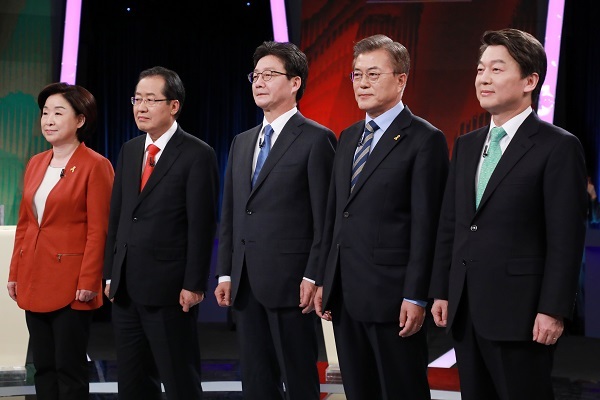‘People in 20s, 30s make up majority of swing voters
By Kim Yon-sePublished : April 20, 2017 - 16:15
One in four voters have yet to decide who they will vote for in the May 9 presidential election, various opinion surveys showed.
In particular, those aged between 19 and 39 are the largest group of swing voters.
According to a poll from Hankook Research, 25.6 percent of the respondents said they could change who they will vote for as events unfold in the lead-up to the election. The firm conducted the survey on 1,200 sample voters nationwide from April 18 to 19.
In particular, those aged between 19 and 39 are the largest group of swing voters.
According to a poll from Hankook Research, 25.6 percent of the respondents said they could change who they will vote for as events unfold in the lead-up to the election. The firm conducted the survey on 1,200 sample voters nationwide from April 18 to 19.

A poll by Embrain indicated that the percentage of swing voters came to 26.7 percent.
By age, 50.3 percent of those aged between 19 and 29 said they could change their support. In addition, 31.9 percent of those in their 30s said they are undecided.
The percentage of floating voters in their 40s posted 20.8 percent, followed by 19.5 percent in their 50s and 16.9 percent in their 60s or more.
Polls by other firms, such as Realmeter, Cantarpublic and R&Search posted a similar trend of swing voters.
Polls show that front-runner and liberal candidate Moon Jae-in topped the list in supporters’ loyalty with about 75-78 percent of them saying they would not change their mind, followed by conservative candidate Hong Joon-pyo with 70-75 percent.
While about 70 percent of supporters for centrist Ahn Cheol-soo, who is polling in second, said they would stick to their choice, less than 40 percent of supporters for progressive Sim Sang-jeung and conservative Yoo Seong-min said the same.
Political experts cited the importance of the ongoing TV debates in getting swing votes.
“After the first round of TV debates (on April 13), there was a change in approval ratings,” said professor Kim Yong-churl of Pusan National University.
Claiming Korea’s elections have usually been swayed by “image-based politics,” Kim said the televised debates will be a key factor.
Polls for the second round of debates, held Wednesday, are set to be released Friday and Saturday.
Four more TV debates are scheduled for Sunday, Tuesday, April 28 and May 2.
Some experts have argued TV debates could have an adverse effect on some candidates.
They say the TV debate winner could lose in the election as supporters of his or her closest competitor rush to cast their ballots.
By Kim Yon-se (kys@heraldcorp.com)








![[Graphic News] More Koreans say they plan long-distance trips this year](http://res.heraldm.com/phpwas/restmb_idxmake.php?idx=644&simg=/content/image/2024/04/17/20240417050828_0.gif&u=)
![[KH Explains] Hyundai's full hybrid edge to pay off amid slow transition to pure EVs](http://res.heraldm.com/phpwas/restmb_idxmake.php?idx=644&simg=/content/image/2024/04/18/20240418050645_0.jpg&u=20240419100350)





![[From the Scene] Monks, Buddhists hail return of remains of Buddhas](http://res.heraldm.com/phpwas/restmb_idxmake.php?idx=652&simg=/content/image/2024/04/19/20240419050617_0.jpg&u=20240419175937)

![[KH Explains] Hyundai's full hybrid edge to pay off amid slow transition to pure EVs](http://res.heraldm.com/phpwas/restmb_idxmake.php?idx=652&simg=/content/image/2024/04/18/20240418050645_0.jpg&u=20240419100350)

![[Today’s K-pop] Illit drops debut single remix](http://res.heraldm.com/phpwas/restmb_idxmake.php?idx=642&simg=/content/image/2024/04/19/20240419050612_0.jpg&u=)